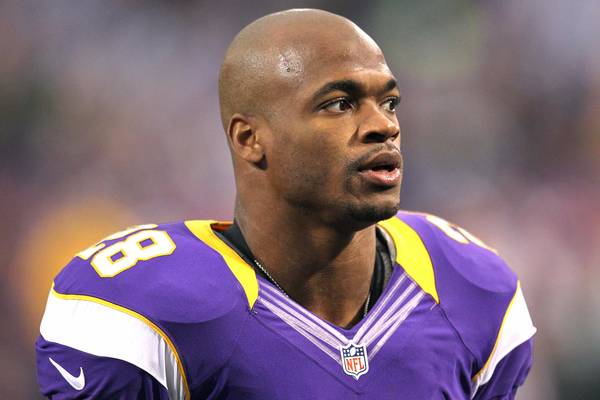While the media seems largely focused on the fact that the Minnesota Vikings finally decided to bench its star running back Adrian Peterson, a more important—and politically incorrect—question needs to be asked: To what extent, if any, did Adrian Peterson’s religious beliefs and cultural background as an African American contribute to him beating and injuring his son?

Many details about the case have been well publicized and have not been denied by Peterson: Last spring, he “disciplined” his four-year-old son at his Houston home by stuffing leaves in his mouth and hitting him repeatedly with the branch of a tree or “switch.” The boy was also reportedly beaten with a belt.
The “whoopings,” as Peterson called them, resulted in the boy sustaining lacerations, bruises, and welts on his legs, arms, buttocks, and genitals. The injuries were reported by a doctor after the boy’s mother took him for a previously scheduled appointment.
The 29-year-old Peterson is a deeply religious Christian, and his Twitter feed is peppered with religious proclamations and snapshots of Bible verses. The conservative Christian 700 Club has featured Peterson on its website. And Peterson seems to wholeheartedly believe that children should be disciplined using physical punishment.
Upon questioning, his son told his mother that Peterson “likes belts and switches and has a whooping room.” On September 15, Peterson tweeted, “Deep in my heart I have always believed I could have been one of those kids that was lost in the streets without the discipline instilled in me by my parents and others relatives.” Peterson’s adherence to such an ideology is particularly remarkable, given the fact that another of his sons was allegedly beaten to death when the boy was two years old.
After intense public pressure, the cancellation of a major NFL sponsor, apparent threats by other companies to cancel sponsorship, and the news that Peterson had been accused of abusing another son in 2013 while Peterson was not charged in that case, the Vikings dramatically changed course. Initially, after Peterson was indicted on child abuse charges, the Vikings had him sit out one game and then allowed him to rejoin the team. After the public outcry, officials barred him from all team activities. Some predict he will never again wear a Vikings jersey.
It probably wasn’t helpful to Peterson’s case that after the initial slap on the wrist, he sent out this tweet, indicating that God was on his side.
Many people Doubted YOU! Now look at you! You didnt Overcome Major Obstacles in your Life! You Identified who u were in Christ! . . . If you could only see how God views you! Just understand that you are a Mighty Vessel that God Chose to do Great things!
Now, statistics on the use of corporal punishment in conservative Christian households and those in the African American community are raising questions as to whether Peterson’s religious beliefs and cultural background fueled his ideology about the need to control his son’s behavior in this way and, ultimately, to injure him.
I’m not aware of any studies that show that children in one faith or racial group are more at risk for abuse than others, but there is reason to believe that children who are physically punished are more at risk for being physically abused than those who are not physically punished. Studies show that a vast majority of child abuse is delivered in the midst of adults using corporal punishment. Furthermore, children are more likely to be injured when parents use corporal punishment frequently or use implements to spank children.[1]
Corporal punishment among conservative Christians
Americans overall have been spanking less and less. The percentage of parents who favor corporal punishment has dropped from 84 percent in 1986 to about 70 percent in 2012. Many Christians choose not to spank their kids, pointing out that, according to the Bible, Jesus never advocated that children should be taught respect through hitting. Some Christian leaders have changed their views and now oppose spanking.
On the other hand, conservative Christians tend to believe that their religion requires them to spank. Many justify this choice by referencing numerous passages in the Book of Proverbs that condone using “the rod” to discipline children. For example, Proverbs 23:13—14 states: “Do not withhold discipline from a child; if you punish them with the rod, they will not die. Punish them with the rod and save them from death.”
Some Christians also see the need to use corporal punishment to correct children’s inherent “sinfulness.” Days after Peterson’s indictment, a psychologist and minister with the conservative Christian organization Focus on the Family wrote an op-ed in Time magazine expressing this sentiment:
Unfortunately, each of us enters this world with desires that are selfish, unkind, and harmful to others and ourselves. Spanking, then, can be one effective discipline option among several in a parents’ tool chest as they seek to steer their children away from negative behaviors and guide them toward ultimately becoming responsible, healthy, happy adults.
Corporal punishment among African Americans
Similarly, African Americans also rely heavily on the use of corporal punishment. One study that looked at the childrearing of kindergartners shows that 89 percent of black parents spanked compared to 79 percent of white parents. According to a New York Times op-ed written by Georgetown University Sociology Professor and author Michael E. Dyson, the belief among African Americans that they must discipline their children using physical punishment is inherited from the days of slavery.
The lash of the plantation overseer fell heavily on children to whip them into fear of white authority. Terror in the field often gave way to parents beating black children in the shack, or at times in the presence of the slave owner in forced cooperation to break a rebellious child’s spirit. Black parents beat their children to keep them from misbehaving in the eyes of whites who had the power to send black youth to their deaths for the slightest offense.
Dyson goes on to say, “If beating children began, paradoxically, as a violent preventive of even greater violence, it was enthusiastically embraced in black culture, especially when God was recruited. As an ordained Baptist minister with a doctorate in religion, I have heard all sorts of religious excuses for whippings.”
Defending Peterson
This association might explain why a number of black athletes have come to Peterson’s defense, often stating that the kind of beating Peterson gave his son is not all that uncommon among blacks. On a New York radio broadcast, Lions running back Reggie Bush said he and many of his friends were punished in the same way as Peterson chose to do with his son and that he would “harshly” punish his one-year-old daughter if need be. “I definitely will try to—will obviously not leave bruises or anything like that on her,” Bush said. “But I definitely will discipline her harshly depending on what the situation is.” Initially Bush said he’d consider using a switch but then said he misspoke. “I said spanking,” he said. “Spanking is different than a branch or a stick.”
In an interview on NFL Today, NBA Hall-of-Famer Charles Barkley said corporal punishment is a way of life among the black, southern culture. “Whipping, we do that all the time. Every black parent in the South is going to be in jail under [Peterson’s] circumstances,” Barkley said. Peterson has shown remorse for injuring his child, yet he has continued to defend his decision to “discipline” (what others call “beat”) his child. On the day of his indictment, he told investigators, “I feel very confident with my actions because I know my intent.”
One African American blogger noted:
Corporal punishment is a cultural norm in the black community based on their Christian beliefs. They take to heart biblical passages like Proverbs 13:24. …People may find this abhorrent, but Peterson can use freedom of religion as a defense. His lawyer will put the Bible on the stand.
Meanwhile, some celebrated football stars, both black and white, such as Cris Carter and Boomer Esiason, have deplored Peterson’s actions and his justification that he was simply disciplining his child the same way that he was disciplined in his youth.
It’s safe to say the conversation about the morality of corporal punishment is not over. Sadly, it took a high-profile case of severe child abuse to begin a meaningful public discussion on this topic. But in addition to debating the pros and cons of physical punishment, we must also examine the religious and cultural roots of spanking among conservative Christians and in the African American community, as well as Americans of all faiths and races. If we don’t, we have little chance to protect children such as the son of Adrian Peterson.





